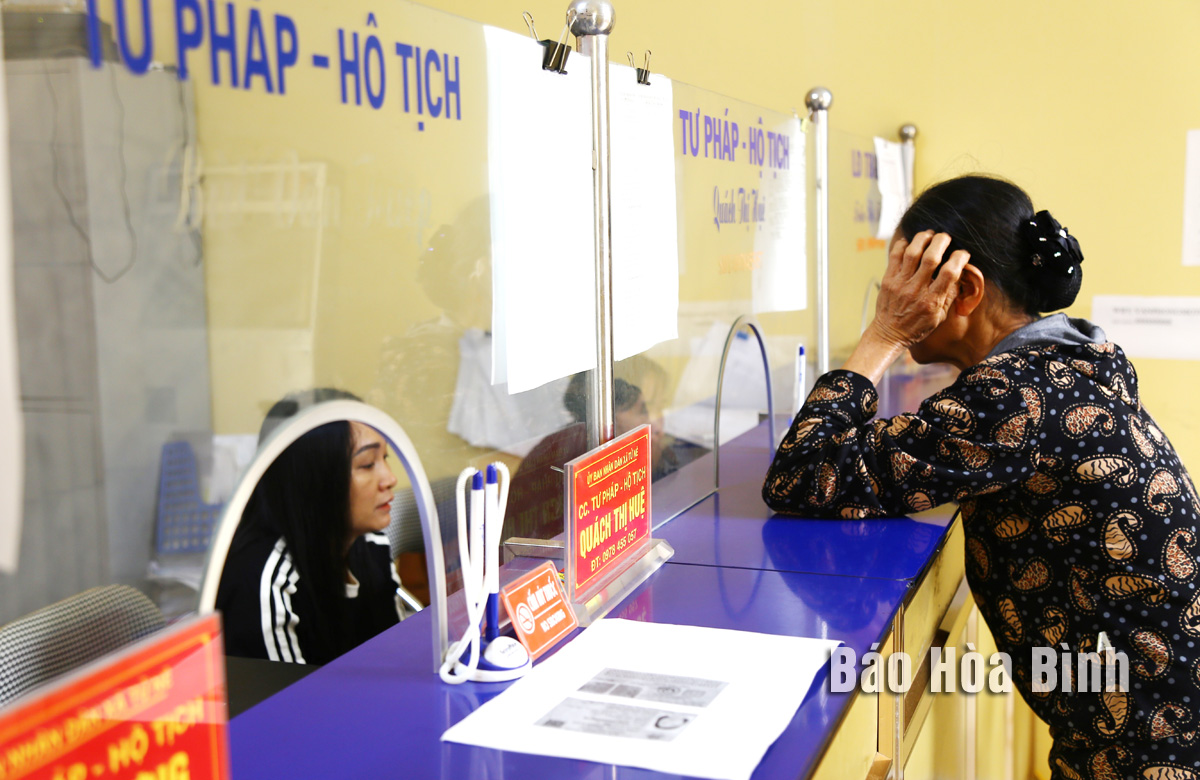
Over recent times, the implementation of the single-window mechanism for administrative procedure settlement in electronic environments at various units and localities has seen positive changes.
In Tu Ne commune, Tan Lac district, a staff at the
local section for public administrative reception and result return offers
guidance for a resident.
In Tu Ne commune, Tan Lac district, a considerable number of people arrived
early in the morning to carry out administrative procedures at the local
section for administrative reception and results return.
Bui Thi Mo shared her experience: "I came here to apply for my
grandchild's birth certificate. As it's my first time dealing with this
procedure, I was a bit confused. However, I felt relieved thanks to the staff’s
meticulous and efficient guidance."
In 2023, the mechanism was effectively executed at the provincial centre for
public administrative services as well as the reception and result return units
across all local districts, city, communes, wards, and towns. The on-time file
resolution rate by provincial specialised agencies reached 99.7%.
However, shortcomings remain such as the emergence of additional required
documents not complying with regulations and the complex and cumbersome of some
procedures. The digitisation and reuse of digitised data of files have yet to
meet requirements, while the coordination among public agencies involved in the
process remains ineffective. There has also been a failure to report, explain,
and apologise to citizens and businesses regarding overdue files, especially in
the field of land.
To overcome these limitations, the chairman of the provincial People's
Committee has instructed enhancing the role and responsibility of the heads of
agencies and further implementing the single-window mechanism as prescribed.
Also necessary are timely review, reduction and simplification of procedures
and business regulations to create convenience and reduce costs for citizens
and enterprises.
Stressing the importance of public disclosure and transparency, the leader
requested all administrative documents be digitised according to regulations
and digitisation linked to the completion of tasks by public personnel
involved.
The Hoa Binh provincial People's Committee held its monthly meeting on March 26 to review the progress of key projects, assess budget revenue and public investment disbursement, provide feedback on draft documents for submission to the provincial Party Committee's Standing Board, and discuss other important matters related to the committee's governance activities.
Playing a key role in Hoa Binh province’s economic development, Luong Son district has been focusing on science and technology development, innovation, and digital transformation.
Identifying the application of online public services as a key step in administrative procedure reform and e-government building, Kim Boi district has proactively provided services and supported residents and businesses in accessing and utilising full-process online public services promptly and efficiently. The locality aims to lift the rate of end-to-end online public services to over 90%, with all officials and civil servants handling tasks in the digital environment.
Nguyen Anh Tuyet, hailing from a family steeped in the ancient art of herbal medicine, is transforming local medicinal herbs into high-value concentrated extracts, elevating their worth and healing potential.
Nguyen Phi Long, an alternate member of the Party Central Committee, Secretary of the Hoa Binh provincial Party Committee, and head of the steering committee for the province's key projects, chaired a conference on March 25 to discuss measures for implementing the project on constructing the Hoa Lac - Hoa Binh road and upgrading the Xuan Mai - Hoa Binh section of National Highway 6 under the public-private partnership (PPP) model.
Administrative reform has been identified as a key priority in enhancing state governance, improving the business environment, and facilitating services for citizens and enterprises.



